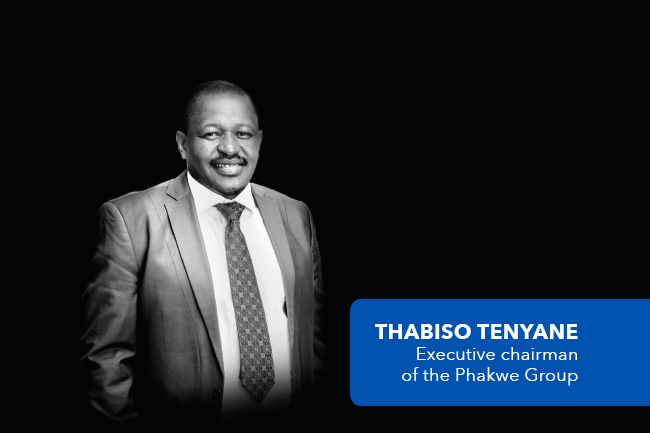Thabiso Tenyane, executive chairman of the Phakwe Group, took an interest in the energy sector as far back as 2010, around the time that the South African government announced its Integrated Resource Plan and, subsequently, the Renewable Energy Independent Power Producer Procurement (REIPPP) programme.
He was so inspired that he invested into the first wind farm to be connected to the national electricity grid – the 27 MW Metrowind farm near Port Elizabeth, of which he remains chairman and the second-biggest shareholder.
The success of the project propelled the Phakwe Group into the energy environment, particularly renewables, and it has since evolved to become one of the most respected companies in the sector, offering a comprehensive range of technologies and specialist knowledge, including project development and structuring; site identification; environmental impact assessments; the selection of strategic partners; arranging of finance; bidding under the REIPPP; and taking successful projects to financial closure.
‘Renewable energy is still a relatively new concept in developing countries in Africa, and promoting and enhancing the viability of projects requires extensive planning and risk management while still ensuring multi-stakeholder best interests,’ says Tenyane. ‘With the Phakwe Group’s already strong presence in engineering and telecoms, we had the capability to build on these skills and offer them to the energy marketplace.’
Those skills were successfully proven in 2014 when Phakwe Power, a subsidiary of Phakwe, invested as a 45% equity partner in the ZAR1.8 billion Solar Capital Orange 75 MW PV project. That success led to another subsidiary, Phakwe Solar, investing in a project basket – four in the Northern Cape and two in the North West province – with a shareholding of 15%. Together the projects have a combined generating capacity of 498 MW, with a total investment value of ZAR8.9 billion. Today the investments are even bigger – almost beyond aspirations, given that the group, through its Phakwe Power division and in conjunction with the South African Department of Mineral Resources and Energy, has partnered with the developers of the Grand Inga 3 project in the DRC.
Tenyane explains that this massive dam is part of a greater vision by the international economic community to develop a power grid across Africa, one that will spur the continent’s industrial economic development. ‘This is what I am strongly passionate about,’ he says. ‘The Inga project is a necessity and could really prove to be a sustainable solution to alleviating energy poverty across the continent, while simultaneously stimulating economic growth and facilitating infrastructure development.’
There are other considerations too, such as impact on the environment, human health and socio-cultural aspects. The risks are vast and, in some cases, unknown. Given how long projects can take to be fully operational, particularly hydro, they require enormous assessment in determining whether a project is financially and economically feasible – and, of course, whether it can meet the energy demand as anticipated.
These are the reassurances that the Phakwe Group is able to provide through its power, telecoms, engineering, investment and consulting divisions. Incidentally, the group – through its aviation division – also surveys and undertakes reconnaissance services for the planning of human settlements and infrastructure. A project the size of Inga, which required the Phakwe Group to set up offices in the DRC, really taps into the vision of the business: to be recognised as the leading group that provides innovative and sustainable solutions. It also aligns to the same inspiration that gave the organisation its ‘brand’, the eagle.
‘Traits of the eagle [include] having fine vision, fearlessness, tenacity, high-flying, visibility and nurturing of the young,’ according to Tenyane. ‘These are the principles that guide us to grow progressively with Africa, and enable us to make a substantial contribution to the development of the continent, our customers and partners. And, of course, employees.
‘Companies are not differentiated by their strategies alone but also by the people they employ to implement those. I identify talented people, groom and guide them to help them achieve their best. It is only then that I determine the strategies I drive in the Phakwe Group to help them and the company achieve objectives.’
These are strategies that also aim to transform the economies of the countries in which the Phakwe Group operates, driven largely by facilitating the creation of long-term, high-quality employment without sacrificing the quality of goods and services required by society.
‘Africa faces a huge energy gap and I believe this is one of the major contributors to slow economic development and poverty. We intend to change the electricity generation and distribution landscape for Africa, and I see each project we undertake as a milestone on a road that is developing our future.’



